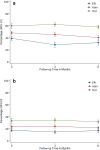Frequency of fatigue and its changes in the first 6 months after traumatic brain injury: results from the CENTER-TBI study
- PMID: 32676767
- PMCID: PMC7815577
- DOI: 10.1007/s00415-020-10022-2
Frequency of fatigue and its changes in the first 6 months after traumatic brain injury: results from the CENTER-TBI study
Erratum in
-
Correction to: Frequency of fatigue and its changes in the first 6 months after traumatic brain injury: results from the CENTER-TBI study.J Neurol. 2021 Jan;268(1):74-76. doi: 10.1007/s00415-020-10174-1. J Neurol. 2021. PMID: 32910254 Free PMC article. No abstract available.
Abstract
Background: Fatigue is one of the most commonly reported subjective symptoms following traumatic brain injury (TBI). The aims were to assess frequency of fatigue over the first 6 months after TBI, and examine whether fatigue changes could be predicted by demographic characteristics, injury severity and comorbidities.
Methods: Patients with acute TBI admitted to 65 trauma centers were enrolled in the study Collaborative European NeuroTrauma Effectiveness Research in TBI (CENTER-TBI). Subjective fatigue was measured by single item on the Rivermead Post-Concussion Symptoms Questionnaire (RPQ), administered at baseline, three and 6 months postinjury. Patients were categorized by clinical care pathway: admitted to an emergency room (ER), a ward (ADM) or an intensive care unit (ICU). Injury severity, preinjury somatic- and psychiatric conditions, depressive and sleep problems were registered at baseline. For prediction of fatigue changes, descriptive statistics and mixed effect logistic regression analysis are reported.
Results: Fatigue was experienced by 47% of patients at baseline, 48% at 3 months and 46% at 6 months. Patients admitted to ICU had a higher probability of experiencing fatigue than those in ER and ADM strata. Females and individuals with lower age, higher education, more severe intracranial injury, preinjury somatic and psychiatric conditions, sleep disturbance and feeling depressed postinjury had a higher probability of fatigue.
Conclusion: A high and stable frequency of fatigue was found during the first 6 months after TBI. Specific socio-demographic factors, comorbidities and injury severity characteristics were predictors of fatigue in this study.
Keywords: Head injury; Longitudinal studies; Neurological disorders; Post-traumatic fatigue.
Conflict of interest statement
The authors declare no conflict of interest.
Figures






